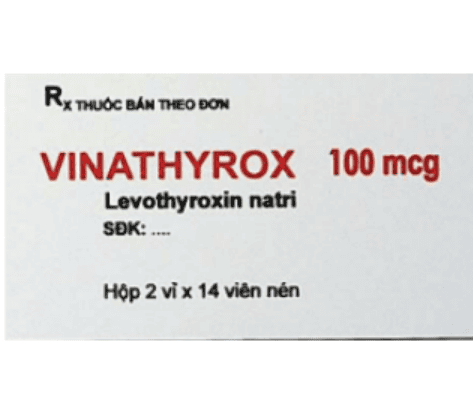This is an automatically translated article.
Posted by Doctor Nguyen Thi Ngoc - Department of Examination & Internal Medicine - Vinmec Central Park International General Hospital
Hypothyroidism is a condition in which the thyroid gland does not produce enough thyroid hormone to do its job well. Whereas Hyperthyroidism is detected when your body produces too much thyroid hormones, thyroxine (T4) and triiodothyronine (T3), and becomes overactive.
1. Outline of hypothyroidism
Hypothyroidism is a condition in which the thyroid gland does not produce enough thyroid hormone to do its job well. The thyroid gland controls every aspect of body metabolism. In hypothyroidism, the production of thyroid hormone slows down, leading to a slow metabolism and subsequent weight gain. Hypothyroidism is common, accounting for 4.6% of the US population.
According to the American Thyroid Association, hypothyroidism cannot be cured. However, there are medications to treat hypothyroidism, the aim is to improve thyroid function, return thyroid hormone levels to normal, allowing you to lead a normal life.
Hashimoto's thyroiditis is the most common cause of hypothyroidism. This is an autoimmune disease in which the body produces antibodies against its own, causing the thyroid gland to stop producing thyroid hormone and leading to hypothyroidism. Like other autoimmune diseases, Hashimoto's thyroiditis is more common in women than in men.

Đa số trường hợp suy giáp do viêm giáp Hashimoto gây ra
2. Outline of hyperthyroidism
Hyperthyroidism is detected when your body produces too much thyroid hormone, thyroxine (T4) and triiodothyronine (T3), and becomes overactive. If you have hyperthyroidism, you may have a fast heartbeat, eat a lot, be anxious, sweat easily, or lose weight.
Hyperthyroidism occurs most often in 3 ways:
Thyroiditis Thyroid nodules produce too much hormone T4 Autoimmune disease Basedow disease (also known as Graves disease) Thyroiditis stimulates the thyroid gland to produce more thyroid hormone into the body. blood. This condition causes pain and discomfort in the thyroid area. Thyroiditis can be a result of pregnancy and is usually short-lived.
Nodules are common in both hyperthyroidism and hypothyroidism. These nodules are usually benign. In hyperthyroidism, these nodules increase the size of the thyroid gland or overproduce the thyroid hormone T4. Graves' disease is an autoimmune disease in which the body produces antibodies against the thyroid gland itself. This condition causes the thyroid gland to produce too much thyroid hormone.
Medical treatment, radioactive iodine, or surgery are the treatments for hyperthyroidism. If left untreated, hyperthyroidism can cause osteoporosis or cardiac arrhythmias. Both Hashimoto's autoimmune thyroiditis and Basedow's disease are familial.

Sụt cân là một dấu hiệu của bệnh cường giáp
3. Difference between hypothyroidism and hyperthyroidism
Hypothyroidism causes symptoms such as slow metabolism, fatigue and weight gain.
In hyperthyroidism, you will find yourself with more energy, the opposite of hypothyroidism. You may lose weight instead of gaining it as in hypothyroidism. And you may feel anxious and agitated instead of depressed as in hypothyroidism.
The most common contrast between the two diseases is related to thyroid hormone levels. Hypothyroidism reduces thyroid hormone. Hyperthyroidism increases thyroid hormone production.
In the US, hypothyroidism is more common than hyperthyroidism. However, it is not very often to experience hyperthyroidism and then hypothyroidism or vice versa. In Graves' disease, it is rare for hyperthyroidism to change to hypothyroidism several years after stopping antithyroid drugs. The transition from hypothyroidism to hyperthyroidism is even rarer, with approximately 37 cases reported in the literature since 2014 according to the NCBI. Periodic health check-ups help detect diseases early, thereby planning treatment for optimal results. Currently, Vinmec International General Hospital has general health checkup packages suitable for each age, gender and individual needs of customers with a reasonable price policy.
The patient's examination results will be returned to the home. After receiving the results of the general health examination, if you detect diseases that require intensive examination and treatment, you can use services from other specialties at the Hospital with quality treatment and services. outstanding customer service.
Please dial HOTLINE for more information or register for an appointment HERE. Download MyVinmec app to make appointments faster and to manage your bookings easily.
SEE ALSO:
Typical symptoms of hyperthyroidism Is hyperthyroidism dangerous? When does hyperthyroidism turn to hypothyroidism?













